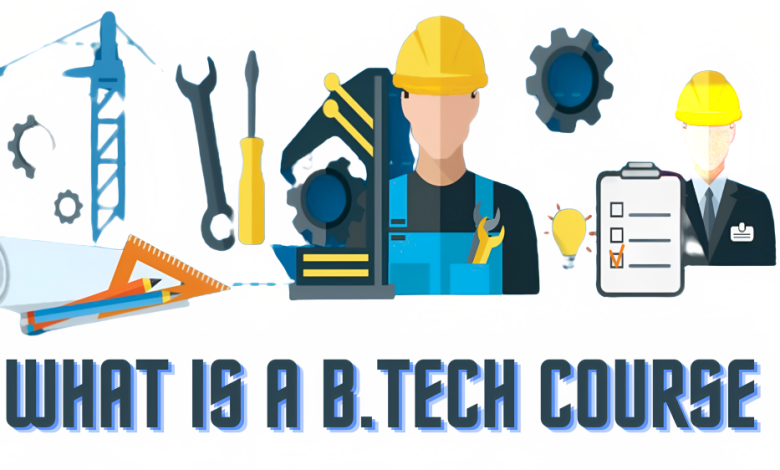What Is a B.tech Course & How to Do It?

B.Tech Course, also known as Bachelor of Technology, is an undergraduate academic degree program in the field of Engineering and Technology. It is typically a four-year program that covers a range of subjects such as Mathematics, Physics, Chemistry, and Engineering concepts
To pursue a B.Tech course, you need to fulfill certain eligibility criteria, which may vary from institution to institution. Generally, you must have completed your higher secondary education (10+2) with Science stream (Physics, Chemistry, and Mathematics) from a recognized board or institution. You will also need to appear for an entrance exam such as JEE Main, JEE Advanced, or any state-level engineering entrance exam.
What Is B.tech Course?
B.Tech or Bachelor of Technology is an undergraduate academic degree program that focuses on engineering and technology. The course is designed to provide students with a comprehensive understanding of technical concepts and their practical applications.
B.Tech course is typically a four-year program that covers various engineering disciplines such as mechanical, electrical, civil, computer science, electronics, and communication engineering, among others. The course curriculum includes theoretical subjects, practical sessions, and industry-based projects to develop the skills required for the engineering profession.
Upon completing a B.Tech course, graduates can pursue a career in diverse fields such as research and development, product design, software development, manufacturing, consulting, and many more. They can also opt for higher education such as a Master’s degree in Engineering, Management, or pursue research in their respective fields.
Follow These Steps for B. TECH Course
- Research: Research different colleges and universities that offer B.Tech courses and the specialisations they offer.
- Eligibility: Check the eligibility criteria for the course and the entrance exam.
- Entrance Exam: Register for the entrance exam and prepare well for it.
- Application Process: Once you have cleared the entrance exam, you will need to apply for admission to the college or university of your choice.
- Course Duration: B.Tech courses generally take four years to complete.
- Specialisation: Choose your specialisation based on your interests and career goals. Some common specialisations include Civil Engineering, Mechanical Engineering, Computer Science Engineering, Electronics and Communication Engineering, and Chemical Engineering.
- Curriculum: Study the curriculum of your chosen B.Tech course and focus on learning the core concepts of your specialization.
- Internships: Try to get internships in reputed companies during your course, which will provide you with practical experience.
- Placements: Most colleges and universities have placement cells that help students secure jobs after completing their course.
Overall, pursuing a B.Tech course requires a lot of hard work, dedication, and passion for the field of engineering and technology. It can provide you with a solid foundation for a successful career in the industry.
Some popular courses in B.Tech:
- (CSE) Computer Science Engineering
- (ECE) Electronics and Communication Engineering
- (ME) Mechanical Engineering
- (EE) Electrical Engineering
- (CE) Civil Engineering
- (IT) Information Technology
- (CHE) Chemical Engineering
- (AE) Aerospace Engineering
- (BT) Biotechnology
- (AI & ML) Artificial Intelligence and Machine Learning
- Data Science and Analytics
- Robotics and Automation Engineering
These courses have good career prospects and offer excellent opportunities for growth and development in various sectors. Students can choose a specialisation that aligns with their interests and aptitudes to build a successful career in their chosen field
What Educational Qualification Is Required for B.tech.eligibility Criteria for B.tech in Hindi)
- Candidates must have completed their 10+2 education from a recognized board with Physics, Chemistry, and Mathematics as compulsory subjects.
- Candidates must have secured a minimum percentage of marks in their 10+2 education, usually ranging from 50% to 75%, depending on the university or college.
- Some universities or colleges may require candidates to appear and qualify in entrance examinations like JEE (Joint Entrance Examination), BITSAT (Birla Institute of Technology and Science Admission Test), or other state-level entrance exams.
- Candidates may also need to meet certain age requirements, which may vary depending on the university or college.
Science Related Courses After 12th
If you have already completed a Bachelor’s degree in engineering (B.Tech), and you have also passed your 12th grade, you may consider pursuing a postgraduate degree to advance your career prospects. Here are some options you can consider:
Master of Business Administration (MBA): Pursuing an MBA after B.Tech can help you develop business acumen and management skills. This degree can prepare you for leadership roles in various industries.
Master of Science (MSc): Pursuing a Master’s degree in a technical field can help you develop specialized skills and knowledge. This can open up career opportunities in research, development, and engineering.
Master of Technology (MTech): Pursuing an MTech degree can help you specialize in a particular engineering field. This can help you advance your career in areas such as design, development, and research.
Post Graduate Diploma in Management (PGDM): PGDM is a management program similar to an MBA. This program provides specialization in specific areas of management, such as finance, marketing, or human resources.
Government Jobs: You can also apply for various government jobs, such as Civil Services, SSC, Banking, and Railways, among others. These jobs require candidates to have a minimum educational qualification of 12th pass.
Consider your interests, skills, and career goals before deciding on which option to pursue. It is essential to research and evaluate the various programs to determine which one suits you best.

Clear Entrance Test for B.tech Course
The entrance test for B.Tech courses varies depending on the institution or university that offers the course. However, here are some general tips that might help you prepare for the test:
- Understand the exam pattern: It is important to understand the exam pattern and the type of questions that are asked in the exam. Most of the entrance tests for B.Tech courses include objective-type questions that test your understanding of mathematics, physics, chemistry, and general aptitude.
- Focus on the basics: It is important to have a strong foundation in the basics of mathematics, physics, and chemistry. Make sure you have a clear understanding of the fundamental concepts before moving on to more complex topics.
- Practice sample papers: Practicing sample papers will help you understand the type of questions that are asked in the exam and will help you develop the skills to solve them quickly and accurately.
- Time management: Time management is crucial during the exam. Make sure you allocate enough time to each section and try to solve the easier questions first to maximize your score.
- Stay updated: Keep yourself updated with the latest developments in the field of science and technology. This will not only help you in the entrance exam but will also give you an edge in the B.Tech course.
Remember, preparation is the key to success. With proper planning, hard work, and dedication, you can ace the entrance test for B.Tech courses. Good luck!
Completed B.Tech Course
Congratulations on completing your B.Tech course! This is a significant achievement, and you should be proud of yourself.
Completing a B.Tech course means that you have acquired a solid foundation in technical knowledge, skills, and problem-solving abilities in your chosen field of engineering. This can open up many career opportunities for you, both in industry and academia.
As you move forward, you may want to consider pursuing higher education, such as a Master’s or PhD, to further develop your expertise and qualifications. You could also explore different career paths, such as research and development, consulting, entrepreneurship, or teaching.
Remember that learning is a lifelong process, and you should continue to build on your knowledge and skills even after completing your B.Tech. Stay curious, keep exploring new ideas, and seek out opportunities for personal and professional growth. Best of luck to you!




